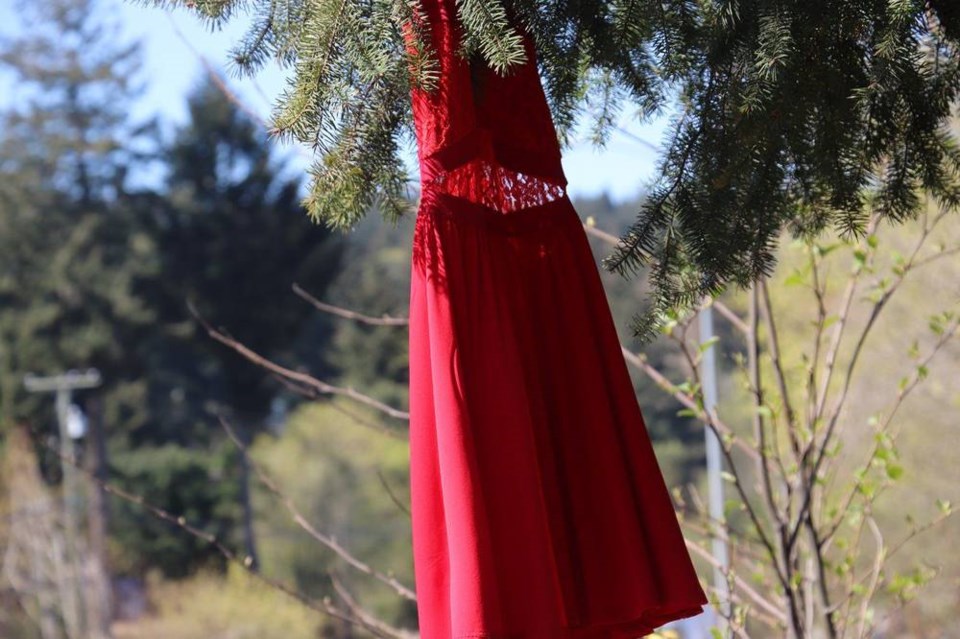A Ladysmith-area First Nation joined forces with the town’s council, firefighters and other residents on Saturday to replace red dresses hanging by the Island Highway that were taken down in an incident caught on video.
More than 100 red dresses had been hung along the highway on Family Day, from Victoria to Port Hardy, in honour of missing and murdered Indigenous women, girls, trans and Two Spirit people.
Nanaimo resident Tina Henderson says she had just finished work and was waiting for her sushi order at Sushi Wara in Ladysmith on April 10 when she noticed two people on the opposite side of the highway using large sticks to take down red dresses and hoisting them out of sight, into the bush.
“We have to as a community, as people, stand up for our missing and murdered Indigenous women, men and children, and to me, that was like a huge violation,” says Henderson.
She says she considered driving across the highway, so she could yell and honk at them, but she figured it was more important to capture what was happening on video.
Initially, she wasn’t sure what to do with the video, so she talked with her “go-to” activist friend, Stephanie Goudie, who posted it on Facebook.
The use of the red dress was originally inspired by the REDress Project, which was initiated by Anishnaabe artist Jaime Black as an “aesthetic response to this critical national issue,” according to Black’s website.
The video has prompted anger, sadness and outrage in the community.
Roxanne Harris, chief of the Stz’uminus First Nation, says she was shocked and disheartened when the video clip was brought to her attention. After viewing it, she called the mayor of Ladysmith, Aaron Stone.
“We have a good working relationship,” she says.
Ladysmith town council and the Stz’uminus chief and council gathered on Saturday to put red dresses up where they were taken down.
Harris says other community members also lent a hand, including the Ladysmith Fire Department and the people behind the Ladysmith Festival of Lights.
“We are working together to try and remedy the situation,” says Harris, adding that people who want to contribute can drop off red dresses at Ladysmith City Hall. May 5 is recognized nationally as Red Dress Day.
Snuneymuxw Elder Yvonne Rigsby-Jones, who helped to hang the red dresses, says this was an opportunity to re-educate the public about what the dresses represent.
“Those red dresses are hung in memory of people,” says Rigsby-Jones, the former executive director of Tsow-Tun Le Lum Society. “There’s love and meaning behind them.
“We don’t know why those men took those dresses down, so they need to know what they signified.”
According to an oft-cited report published by the RCMP in 2014, there are 1,181 police-recorded homicides and unresolved cases of missing Indigenous women in Canada.
Rigsby-Jones believes the number is much higher.
In June 2019, a two-volume report was released by the National Inquiry into Missing and Murdered Indigenous Women and Girls after a series of cross-country public hearings and evidence gathering, including testimonies shared over two years from “2,380 family members, survivors of violence, experts and Knowledge Keepers,” according to the inquiry.
One of the inquiry’s recommendations was for police to put together a national strategy to ensure consistency in mechanisms for reporting missing Indigenous women and girls, and to implement a national database.
The report also calls for a special investigation into failures to investigate cases and police misconduct.
Rigsby-Jones works with the Indian Residential School Survivors Society, where she offers counselling support to individuals and families.
“To hear from families that services aren’t protecting them is devastatingly sad and wrong,” she says.
Harris says the plan is not simply to replace the dresses that were taken down, but to extend their reach, hanging dresses from Ladysmith all the way to Stz’uminus territory.
“We will be making a big statement.”
— The Discourse



